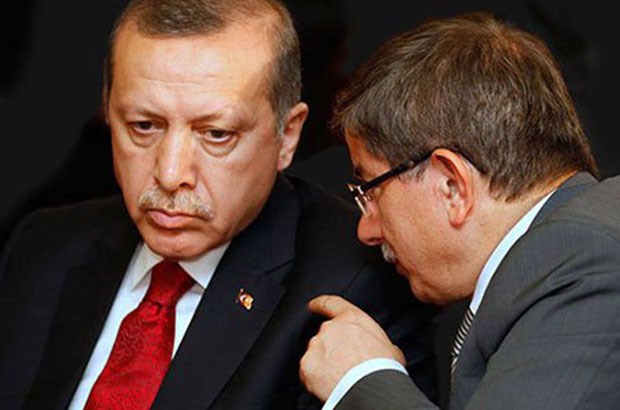After a decade in power, President Recep Tayyip Erdogan’s opposition and former allies have begun to believe that he is vulnerable. Turkey’s worsening economic situation and losses in the most recent municipal elections in major metropolitan areas have fomented deep discontent among the ruling party’s elite and former key allies of Erdogan. Will he hold on?
Former Turkish Prime Minister (PM) Ahmet Davutoglu gave a surprise three-hour interview on July 18 on the popular “BiDeBunuIzle” radio program broadcast by “Voice of Russia”—a subsidiary of the Russian media network Sputnik, the state-owned radio station which broadcasts in different languages. Shortly after the interview, however, journalists were told not to broadcast it, as the former PM’s answers had included harsh criticism of the ruling AK Party (Justice and Development Party) and President Erdogan. Though the interview was broadcast via journalist Yavuz Oghan’s personal YouTube account, the Russian outlet canceled the Turkish show.
While there appear to have been several reasons for the Russian state media outlet not only to cancel the show but also to cancel the contracts of the journalists, the main reason seems to be the current bilateral strategic relations between Russia and Turkey in light of deteriorated relations with the West and the personal relationship between President Erdogan and President Vladimir Putin. During the interview, Ahmet Davutoglu had also voiced concerns regarding Turkey’s decision to purchase a Russian-made S-400 missile system at the cost of relations with NATO allies.
Davutoglu, who was Erdogan’s shadow while serving as his senior adviser on foreign policy, has had enough of his former boss. His frustration exploded with a bang in April, when the former premier published a 15-page manifesto on his Facebook page, detailing the president’s mistakes and the failures of the AK Party and objecting to the arrest of political dissidents.
The criticism of the former PM became even sharper following the country’s Supreme Electoral Council’s decision to re-run the municipal elections in Istanbul. The latest municipal elections turned out to be a political disaster for the ruling AK Party as it lost control in major cities including Ankara and Istanbul.
Even though the AKP won 44% of the overall vote, some experts claim that the recent election results reflect voter discontent over economic inflation, rising unemployment, and the currency crisis in 2018. In fact, the loss of the Istanbul elections, twice, gave Davutoglu and other high-profile political dissidents a better chance to break away from the AKP.
Rumors regarding the new anti–Erdogan group among former AKP bureaucrats and ministers strengthened and reached their peak with the resignation of another heavyweight figure in Erdogan’s Turkey—former Deputy Prime Minister Ali Babacan. A founding member of the ruling AKP, Babacan cited “deep differences” over the party’s direction.
Babacan is considered to be the principal former bureaucrat with the potential to make a difference in the Turkish political arena. Babacan presided over the boom times that followed the 2001 financial crisis, which tore through the political establishment, and that tripled the size of Turkey’s economy. Unlike his former colleagues Davutoglu and Ex-President Abdullah Gul, Babacan refrained from openly criticizing Erdogan or making any political statement and reportedly held a face-to-face meeting with the President before his departure, noting that he had lost “a sense of belonging to the AKP.” As a result, two different influential opposition groups were established in Turkey involving former PM Ahmet Davutoglu’s team on one side, and a combined team made up of Ex-President Abdullah Gul and Ali Babacan supporters.
Yet, while it is unclear whether the two opposition groups will announce a union or maintain different positions and visions, they both will face real challenges as Erdogan retains control over media and state institutions, a factor which undoubtedly will create difficulties for his political opponents.
In the meantime, before the breakaway movement exacerbated the divisions within the AKP earlier this year, Erdogan sent a clear message in February to his followers and party members warning them in an interview on NTV television not to commit “treason” against the party. By doing so, Erdogan has successfully demonized his political opponents, which will hamper the position of dissidents among the conservative strata of Turkey. Thus, Erdogan believes that any breakaway movement against his government is doomed to “failure.” It will be much harder for him to delegitimize his former key allies, however.
Nevertheless, Ahmet Davutoglu with his new political party, along with the Gul-Babacan union, are still far from posing a serious threat to Erdogan’s rule given the divergence between the two groups. Moreover, both groups have a significant number of supporters and sympathizers among the people and within the AKP itself. However, they seem to have different visions of the leadership that are preventing them from uniting together in one party.
Notwithstanding their differences, there needs to be joint action by Davutoglu and Gul to achieve tangible results and not to split the electorate with negative consequences for both groups. So far, the ruling party, which has certainly taken note of the threat arising from defeat in the municipal elections, is doing everything it can to stay in power. Thus, amid growing international and domestic pressure over the AKP, President Erdogan and his team will likely rise with all their might to reinforce their positions.

